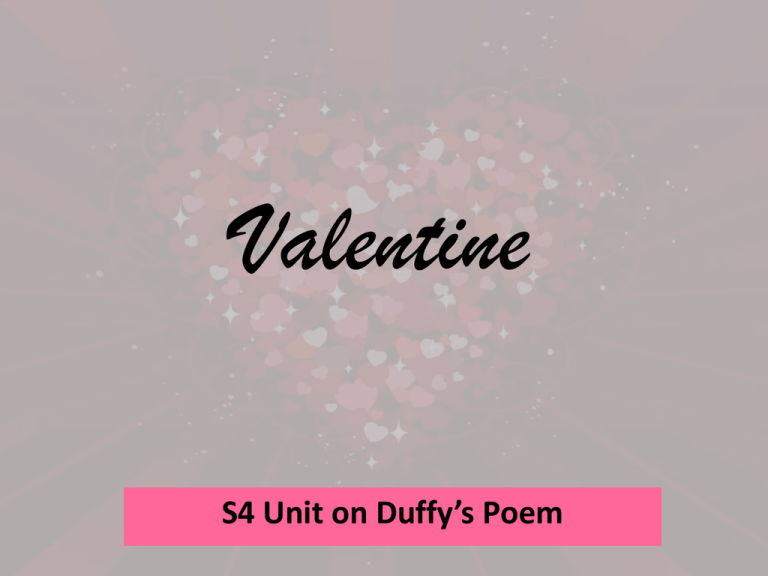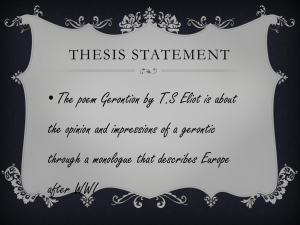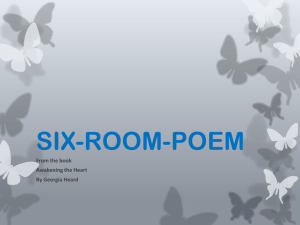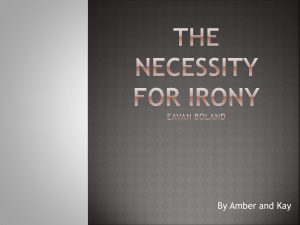
Valentine
S4 Unit on Duffy’s Poem
Title
• Saint Valentine's Day, commonly shortened to Valentine's
Day,[is an annual commemoration held on February 14
celebrating love and affection between intimate
companions.
• The day is named after one or more early Christian
martyrs named Saint Valentine, and was established by
Pope Gelacius I in 496 AD.
• It was deleted from the General Roman Calender of saints
in 1969 by Pope Paul VI.
• It is traditionally a day on which lovers express their love
for each other by presenting flowers, offering
confectionery, and sending greeting cards (known as
"valentines").
• The day first became associated with romantic love in the
circle of Geoffrey Chaucer in the High Middle Ages, when
the tradition of courtly love flourished.
Task
• The title of the poem that we are going
to look at is ‘Valentine’.
• She was asked to pen an original St.
Valentine’s poem for the 14th Feb.
• Clearly we associate associate this day
with a day of love.
• Brainstorm all of the connotations of
the title before we read the poem.
Strange Love…
• Now think about unusual everyday
objects and how they could be used to
represent the idea of love more
accurately.
• You will be given an image of one such
object and must think about the ways
that this could stimulate ideas that link
to the notion of ‘Valentine.’
Context
• This poem is written in the first person.
• The speaker appears to be the poet, addressing her lover
as "you".
• In fact, Carol Ann Duffy wrote Valentine after a radio
producer asked her to write an original poem for St.
Valentine's Day.(Valentine was published in 1993, in the
collection Mean Time.)
• But the poem is universal: it could be from any lover to any
beloved (for example, there is no indication of the sex of
either the "I" or the "you").
• The poem, on the surface, is about the giving of an unusual
present for St. Valentine's Day, but really is an
exploration of love between two people.
• This is a good text to write about, because it has a single
central image, which is developed throughout the poem:
the onion is an extended metaphor for love.
Essay Task
• Discuss a poem that deals with the theme of
love in a more unconventional way.
• Refer to poetic techniques such as; structure,
extended metaphor, symbolism and word
choice.
Introduction
•
•
•
•
T
A
R
T
• ‘Valentine’ by Carol Anne Duffy is a poem which
explores the theme of love in an unconventional
way. One of the most effective ways she does this
is through the use of the extended metaphor.
Duffy also uses word choice and structure
effectively to explore the stages of love that
progress as the onion (her symbol of love) is
peeled and then finally chopped, to suggest that
the speakers absurd gift of an onion to her lover
is in fact a much more profound and honest
representation of love than gifts traditionally
given on St. Valentine’s Day.
Title
• Explain the importance of the title in
underpinning and shattering the reader’s
expectations.
• Words to help:
Preconceived ideas/notions… cliched
• The opening title of the poem ‘Valentine’ clearly
suggests St. Valentine’s Day, traditionally a day where
lovers mutually exchange tokens that are supposed to
signify their love for one another. The title therefore
connotes traditional symbols of love such as; hearts,
chocolate, cards etc to represent this powerful human
emotion. However, in Duffy’s poem she argues that the
onion is a more appropriate exploration of love and
rejects the conventional commercialism of Valentine’s
as indicated initially through her opening line. The title
is the first effective way that Duffy rejects the
conventional to offer a more honest representation of
the poem’s theme.
Paragraph 2 - Structure
In this paragraph explain the ways that the structure of this poem is
unusual for a love poem.
• Mention the importance of the title in setting up and then undermining
our expectaions.
• Make a POINT about free verse, why Duffy has used it and how this poem
contrasts with more traditional love poetry.
• Look at the following EXAMPLES and EXPLAIN their structural significance
in making this poem unusual:
“Not a red rose or a satin heart”
“Not a cute card or kissogram”
• Introduce a new POINT about the importance of the single word lines in
the poem.
• Give an EXAMPLE of a couple of the single word / command –style lines.
• EXPLAIN their significance.
• Say how the structure reflects the changing tone of the poem.
• Say how the structure helps to make this an unconventional love poem?
• The structure of the poem is highly effective as it
consists of six stanzas that concentrate on different
aspects of love and reveal Duffy’s conflicting attitudes
towards it. The fact that the poem is written in free
verse is also apt as it reinforces the argument that
Duffy is trying to make: that love is not governed by
pattern or order; it is unpredictable, at times chaotic
and free. The form/structure of the poem supports this
argument as Duffy uses single isolated line to show
that she rejects the conventional commercialism of
Valentine’s: “Not a red rose or satin heart…Not a cute
card or kissogram.”
Paragraph 3 – Stanza 2
• This paragraph should focus on the second stanza
beginning “I give you an onion”
• Topic sentence: In the next stanza Duffy transforms
the mundane and ordinary into something poetic and
beautiful through the use of the extended metaphor.
In doing so she reveals her initial ideas of love.
In this you should refer to:
• The literal and metaphorical aspects of the comparison
and what they reveal.
• The word choice use.
• The tone created in this stanza.
• In the second stanza Duffy in effect lists reasons why the
onion is an appropriate symbol of love. Firstly, the
conventional romantic symbol of the moon is concealed in
it, reinforced by the moon being believed to govern
women's passions. The brown skin is like a paper bag, and
the shiny pale onion within is like the moon. The "light"
which it promises may be both its literal brightness and
metaphorical understanding (of love) or enlightenment.
The removing of the papery outer layers suggests the
"undressing" of those who prepare to make love. There
may also be a pun (play on words here) as "dressing" (such
as French dressing or salad dressing) is often found with
onions in the kitchen.
Paragraph 4 – Stanza 3
• Topic sentence: In stanza 3 Duffy extends the metaphor
further by comparing the powerful scent of the peeled onion
to the more honest and hurtful aspects of love.
• Discuss the literal and metaphorical comparison of the onion
to love, explaining why is unusual but appropriate.
• Discuss word choice such as “blind” “wobbling” etc.
• The changing tone by commanding statements such as “here.”
• The onion is like a lover because it makes one cry.
The verb "blind" may also suggest the traditional
idea of love's (or Cupid's) being blind. And the
onion reflects a distorted image of anyone who
looks at it, as if this reflection were a "wobbling
photo" - an image which won't keep still, as the
onion takes time to settle on a surface. The
flavour of the onion is persistent, so this taste is
like a kiss which lasts, which introduces the idea
of faithfulness which will match that of the lovers
("possessive and faithful...for as long as we are").
Paragraph 5 – Stanza 5
• Topic sentence: In stanza 5 Duffy again offers her unconventional token of
love as a more profound and appropriate symbol of love, this time
comparing the pungent and overwhelming taste of the raw onion to a
lovers kiss.
• Again discuss the use of the extended metaphor and how it is developed
in this stanza.
• Discuss the tone (“I give…”
• Discuss the ambiguities suggested in this line through word choice and the
element of doubt.
• Anything else that you find links to essay task.
Paragraph 6 – Stanza 6
•
In the final verse Duffy uses tone and the extended metaphor to suggest a
warning. The tone becomes forceful and assertive, “take it” and she reveals
how the final stages of the onion once cut/ chopped reveal ambiguous and
potentially dangerous aspects of love, adopting a much more serious tone to
the one of opening optimism.
• Discuss how the onion is used to highlight ideas
of marriage and what Duffy is saying about this.
• Discuss the changing tone.
• Discuss the threatening nature of the word
choice and the message the reader Is left with at
the end of this stanza.
• The onion is a series of concentric rings, each
smaller than the other until one finds a ring the
size of a wedding ring ("platinum", because of the
colour). But note the phrase "if you like": the
lover is given the choice. Thus the poem, like a
traditional Valentine, contains a proposal of
marriage. There is also a hint of a threat in the
suggestion that the onion is lethal, as its scent
clings "to your knife". The poet shows how the
knife which cuts the onion is marked with its
scent, as if ready to punish any betrayal.
Paragraph 7 - Conclusion
• Exemplar conclusion - In conclusion, Duffy
creates a much more convincing and profound
exploration of love by transforming the onion into
a metaphor for this powerful human emotion.
She successfully extends this comparison
throughout the poem to highlight how the peeled
onion is a much more apt metaphor used to
depict the evolving relationship. Through this she
honestly portrays the aspects of love that are
often neglected in superficial expressions and
offers a fresh view of this subject matter.










